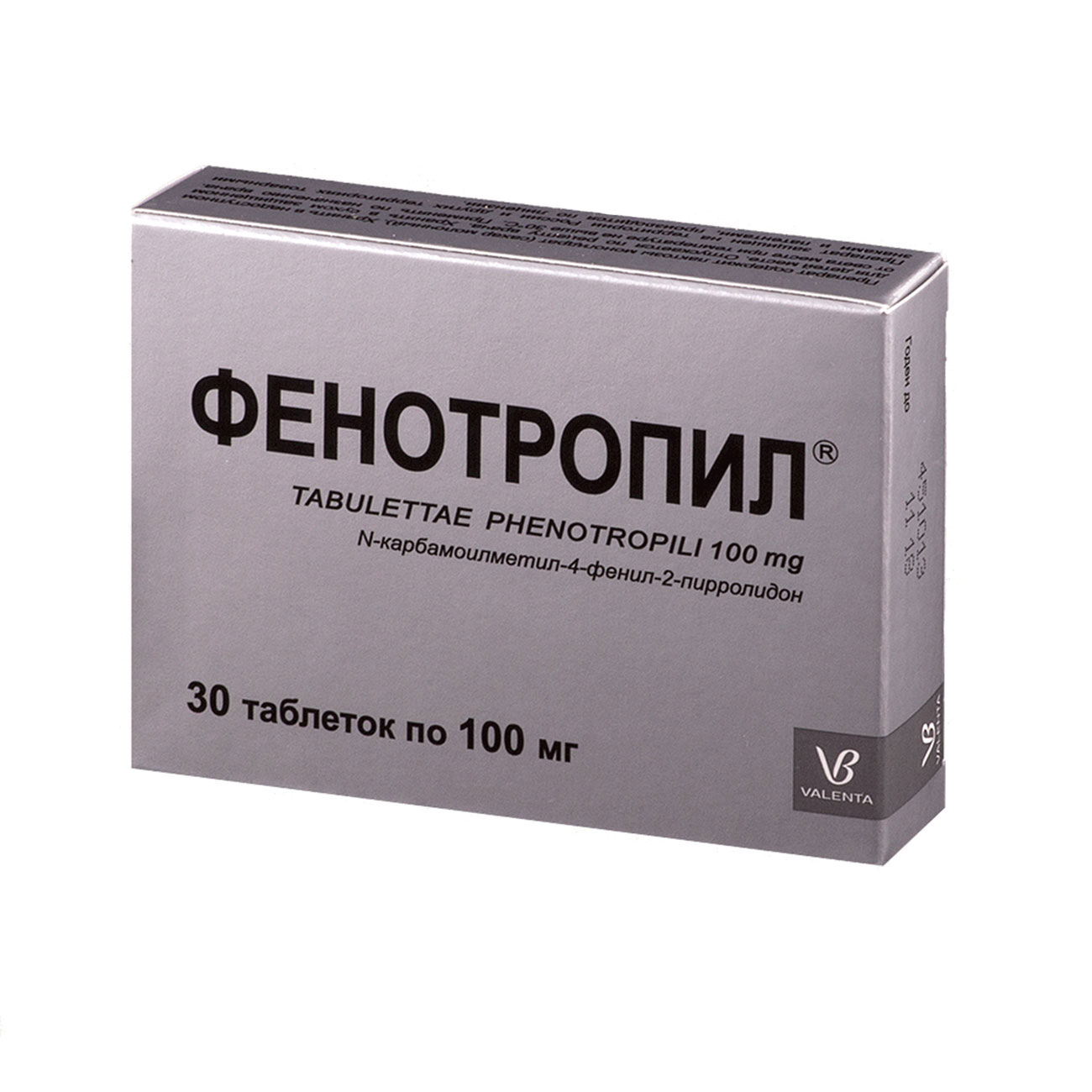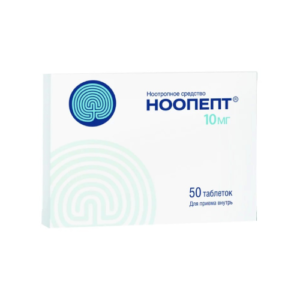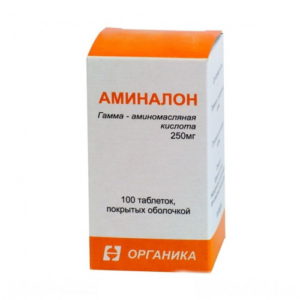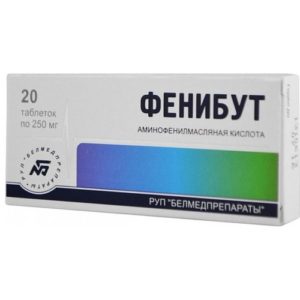Description
Dosage form
Round flat-cylindrical tablets from white to white with a yellowish tint, with a bevel and a risk mark.
Compound
One tablet contains:
active ingredient: phenylpiracetam – 100.00 mg;
excipients: povidone K-17, microcrystalline cellulose, sodium carboxymethyl starch, magnesium stearate.
Pharmacotherapeutic group
nootropic
Pharmacodynamics
PHENOTROPIL is a nootropic drug that has a pronounced antiamnesic effect, has a direct activating effect on the integrative activity of the brain, promotes memory consolidation, improves concentration and mental activity, facilitates the learning process, increases the speed of information transfer between the cerebral hemispheres, increases the resistance of brain tissues to hypoxia and toxic effects, has an anticonvulsant effect and anxiolytic activity, regulates the processes of activation and inhibition of the central nervous system, improves mood.
PHENOTROPIL has a positive effect on metabolic processes and blood circulation in the brain, stimulates redox processes, increases the body’s energy potential by utilizing glucose, and improves regional blood flow in ischemic areas of the brain. It increases the content of noradrenaline, dopamine and serotonin in the brain, does not affect the level of GABA, does not bind to either GABA or GABA receptors, and does not significantly affect the spontaneous bioelectrical activity of the brain.
PHENOTROPIL has no effect on respiration and the cardiovascular system, exhibits an unexpressed diuretic effect, and has anorexigenic activity during course use.
The stimulating effect of PHENOTROPIL is manifested in its ability to have a moderately pronounced effect on motor reactions, in increasing physical performance, in pronounced antagonism to the cataleptic effect of neuroleptics, and also in weakening the severity of the hypnotic effect of ethanol and hexenal. The psychostimulating effect of PHENOTROPIL prevails in the ideator sphere.
The moderate psychostimulating effect of the drug is combined with anxiolytic activity, improves mood, has some analgesic effect, increasing the threshold of pain sensitivity.
The adaptogenic effect of PHENOTROPIL is manifested in an increase in the body’s resistance to stress under conditions of excessive mental and physical stress, fatigue, hypokinesia and immobilization, at low temperatures.
Against the background of taking PHENOTROPIL, an improvement in vision was noted, which manifests itself in an increase in sharpness, brightness and visual fields.
PHENOTROPIL improves the blood supply to the lower extremities.
PHENOTROPIL stimulates the production of antibodies in response to the introduction of an antigen, which indicates its immunostimulating properties, but at the same time it does not contribute to the development of immediate hypersensitivity and does not change the allergic inflammatory reaction of the skin caused by the introduction of a foreign protein.
With the course use of PHENOTROPIL, drug dependence, tolerance, “withdrawal syndrome” do not develop.
The action of PHENOTROPIL is manifested from a single dose, which is important when using the drug in extreme conditions.
PHENOTROPIL does not have teratogenic, mutagenic, carcinogenic and embryotoxic properties. Toxicity is low, the lethal dose in an acute experiment is 800 mg/kg.
Pharmacokinetics
PHENOTROPIL is rapidly absorbed, penetrates into various organs and tissues, easily passes through the blood-brain barrier. The absolute bioavailability of the drug when taken orally is 100%. The maximum concentration in the blood is reached after 1 hour, the half-life is 3-5 hours. PHENOTROPIL is not metabolized in the body and is excreted from the body unchanged. Approximately 40% of the drug is excreted in the urine and 60% of the drug is excreted in the bile and sweat.
Indications
Diseases of the central nervous system of various origins, especially those associated with vascular diseases and metabolic disorders in the brain, intoxication (in particular, in post-traumatic conditions and chronic cerebrovascular insufficiency), accompanied by a deterioration in intellectual-mnestic functions, a decrease in motor activity.
Neurotic states, manifested by lethargy, increased exhaustion, decreased psychomotor activity, impaired attention, memory impairment. Violations of learning processes.
Depression of mild and moderate severity.
Psychoorganic syndromes, manifested by intellectual-mnestic disorders and apathetic-abulic phenomena, as well as sluggish states in schizophrenia. Convulsive conditions.
Obesity (alimentary-constitutional genesis).
Prevention of hypoxia, increased resistance to stress, correction of the functional state of the body in extreme conditions of professional activity in order to prevent the development of fatigue and increase mental and physical performance, correction of the daily biorhythm, inversion of the sleep-wake cycle; Chronic alcoholism (in order to reduce the phenomena of asthenia, depression, intellectual-mnestic disorders).
Contraindications
Individual intolerance.
Carefully:
FENOTROPIL is used with caution in patients with severe organic lesions of the liver and kidneys, severe arterial hypertension, in patients with atherosclerosis, as well as in patients who have previously had panic attacks, acute psychotic states occurring with psychomotor agitation – due to the possibility of exacerbation of anxiety, panic, hallucinations and delirium, as well as in patients prone to allergic reactions to nootropic drugs of the pyrrolidone group.
Pregnancy and lactation:
PHENOTROPIL should not be prescribed during pregnancy and lactation due to the lack of clinical trial data.
Dosage and administration
PHENOTROPIL is used orally, immediately after a meal. The dose of the drug and the duration of treatment should be determined by the doctor. Doses vary depending on the characteristics of the patient’s condition. The average single dose is 150 mg (from 100 mg to 250 mg); the average daily dose is 250 mg (from 200 mg to 300 mg). The maximum allowable dose is 750 mg per day. It is recommended to divide the daily dose into 2 doses. Take a daily dose of up to 100 mg once in the morning, and over 100 mg divide the daily dose into two doses. The duration of treatment can vary from 2 weeks to 3 months. The average duration of treatment is 30 days. If necessary, the course can be repeated in a month.
To improve performance – 100-200 mg once in the morning, for 2 weeks (for athletes – 3 days).
The recommended duration of treatment for patients with alimentary-constitutional obesity is 30-60 days at a dose of 100-200 mg once a day (in the morning). It is not recommended to take FENOTROPIL later than 15 hours.
Side effects
Insomnia (in case of taking the drug later than 15 hours). In some patients, in the first 1-3 days of taking the drug, psychomotor agitation, hyperemia of the skin, a feeling of warmth, and an increase in blood pressure may occur.
Overdose
There were no cases of overdose.
Treatment: symptomatic therapy.
drug interaction
PHENOTROPIL may enhance the effect of drugs that stimulate the central nervous system, antidepressants and nootropic drugs.
special instructions
With excessive psycho-emotional exhaustion against the background of chronic stress and fatigue, chronic insomnia, a single dose of PHENOTROPIL on the first day can cause a sharp need for sleep. Such patients on an outpatient basis should be advised to start a course of taking the drug on non-working days.
Application in pediatrics
The appointment of PHENOTROPIL to children is not recommended due to the lack of data on the use of the drug in children.



